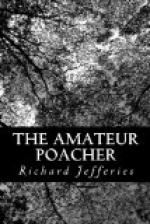After a long look across, I began to examine the stream near at hand: the rushes and flags had forced the clear sweet current away from the meadow, so that it ran just under the bank. I was making out the brown sticks at the bottom, when there was a slight splash—caused by Orion about ten yards farther up—and almost at the same instant something shot down the brook towards me. He had doubtless landed a jack, and its fellow rushed away. Under a large dead bough that had fallen across its top in the stream I saw the long slender fish lying a few feet from the bank, motionless save for the gentle curving wave of the tail edges. So faint was that waving curl that it seemed caused rather by the flow of the current than the volition of the fish. The wings of the swallow work the whole of the longest summer day, but the fins of the fish in running water are never still: day and night they move continuously.
By slow degrees I advanced the hazel rod, keeping it at first near to and parallel with the bank, because jack do not like anything that stretches across them; and I imagine other fish have the same dislike to right angles. The straight shadow even seems to arouse suspicion—no boughs are ever straight. Perhaps, if it were possible to angle without a rod, there would be more success, particularly in small streams. But after getting the stick almost out far enough, it became evident that the dead branch would not let me slip the wire into the water in front of the jack in the usual way. So I had to draw it back again as gradually as it had been put forth.
With fish everything must be done gradually and without a jerk. A sudden jerking movement immediately alarms them. If you walk gently by they remain still, but start or lift the arm quickly and they dart for deep water. The object of withdrawing the rod was to get at and enlarge the loop in order that it might be slipped over his tail, since the head was protected by the bough. It is a more delicate operation to pass the wire up from behind; it has to go farther before the spot that allows a firm grip is reached, and fish are well aware that natural objects such as twigs float down with the current. Anything, therefore, approaching from behind or rubbing upwards is suspicious. As this fish had just been startled, it would not do to let the wire touch him at all.
After enlarging the loop I put the rod slowly forth again, worked the wire up stream, slipped the noose over his tail, and gently got it up to the balance of the fish. Waiting a moment to get the elbow over the end of the rod so as to have a good leverage, I gave a sudden jerk upwards, and felt the weight instantly. But the top of the rod struck the overhanging bough, and there was my fish, hung indeed, but still in the water near the surface. Nor could I throw it on the bank, because of the elder bushes. So I shortened the rod, pulling it in towards me quickly and dragging the jack through the water. The pliant wire had cut into the scales and skin—he might have been safely left suspended over the stream all day; but in the eagerness of the moment I was not satisfied till I had him up on the mound.




